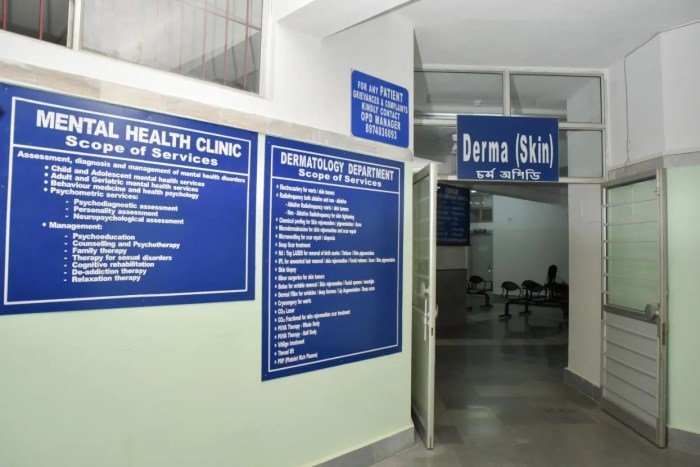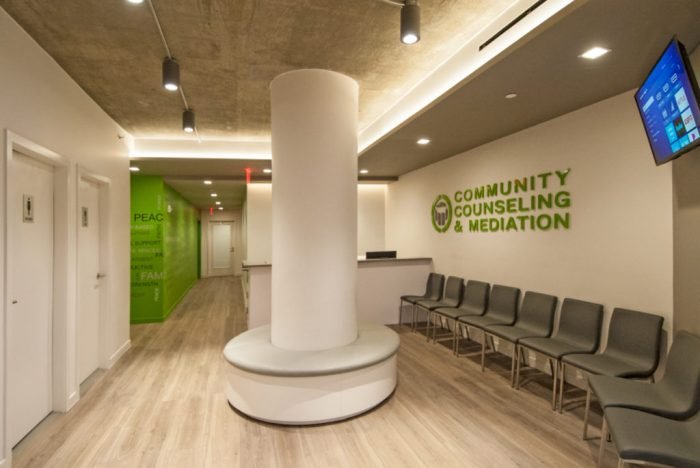Behavioral health clinics are vital resources for individuals seeking support and treatment for mental health conditions. These clinics provide a comprehensive range of services, including therapy, medication management, and support groups, all aimed at promoting mental well-being and improving quality of life.
Understanding the role of behavioral health clinics, the types of services they offer, and how to access them is crucial for individuals seeking mental health care. This guide will explore the importance of behavioral health, the different types of clinics available, and the various mental health conditions treated.
What is a Behavioral Health Clinic?

Behavioral health clinics are essential components of the healthcare system, providing specialized care for individuals experiencing mental, emotional, and behavioral challenges. They offer a range of services designed to promote mental well-being and improve quality of life.
Types of Behavioral Health Clinics
Behavioral health clinics cater to diverse needs and preferences, offering various settings and levels of care.
- Outpatient Clinics:These clinics provide non-residential services, allowing individuals to receive treatment while maintaining their daily routines. Outpatient clinics offer a wide range of services, including individual therapy, group therapy, medication management, and support groups. They are suitable for individuals with mild to moderate mental health conditions who can benefit from regular, structured sessions.
- Inpatient Clinics:Inpatient clinics provide 24-hour care in a hospital or residential setting for individuals requiring intensive treatment for severe mental health conditions. These clinics offer a comprehensive approach to care, including individual therapy, group therapy, medication management, and crisis intervention. Inpatient treatment is typically recommended for individuals experiencing suicidal thoughts, severe depression, psychosis, or other conditions that require close monitoring and support.
- Specialized Clinics:These clinics focus on specific populations or mental health conditions, offering tailored treatment programs and expertise. Examples include clinics specializing in addiction treatment, eating disorders, trauma, or child and adolescent mental health.
Services Offered by Behavioral Health Clinics
Behavioral health clinics offer a comprehensive range of services designed to address the multifaceted aspects of mental health.
- Therapy:Therapy is a cornerstone of behavioral health treatment, providing individuals with a safe and supportive environment to explore their thoughts, feelings, and behaviors. Different types of therapy include cognitive-behavioral therapy (CBT), dialectical behavior therapy (DBT), and psychodynamic therapy. Therapy can help individuals develop coping mechanisms, manage stress, improve relationships, and overcome mental health challenges.
- Medication Management:For some individuals, medication can be a valuable tool in managing mental health conditions. Behavioral health clinics offer medication management services, including assessments, prescriptions, and ongoing monitoring. Medication management is often used in conjunction with therapy to achieve optimal outcomes.
- Support Groups:Support groups provide a sense of community and connection for individuals facing similar challenges. They offer a safe space for sharing experiences, coping strategies, and support. Support groups can be beneficial for individuals with specific conditions, such as anxiety, depression, or addiction.
The Importance of Behavioral Health

Behavioral health is an essential component of overall well-being, encompassing mental and emotional health. Just as physical health is vital for our bodies, mental health is crucial for our minds and how we navigate life’s challenges.
Mental Health and Overall Well-being
Mental health is a fundamental aspect of overall well-being, influencing how we think, feel, and behave. When our mental health is strong, we can cope with stress, build healthy relationships, make sound decisions, and achieve our goals. Conversely, poor mental health can lead to a range of difficulties, impacting our ability to function effectively in various aspects of life.
Prevalence of Mental Health Conditions
Mental health conditions are widespread, affecting millions of people worldwide. According to the World Health Organization (WHO), one in four people will experience a mental health condition at some point in their lives. These conditions can range from mild to severe, and can significantly impact individuals’ lives.
Impact of Mental Health Conditions on Individuals and Society
Mental health conditions can have a profound impact on individuals and society as a whole. Individuals may experience difficulties with work, relationships, and daily activities. Untreated mental health conditions can lead to increased healthcare costs, reduced productivity, and social isolation.
Furthermore, mental health conditions can contribute to substance abuse, violence, and suicide.
Behavioral Health Clinics and Improving Mental Health Outcomes
Behavioral health clinics play a crucial role in addressing the mental health needs of individuals and communities. These clinics provide a range of services, including:
- Assessment and Diagnosis:Clinicians conduct thorough assessments to identify and diagnose mental health conditions.
- Therapy and Counseling:Therapists offer a variety of evidence-based treatments, such as cognitive behavioral therapy (CBT) and psychodynamic therapy, to help individuals manage symptoms, develop coping skills, and improve their overall well-being.
- Medication Management:Psychiatrists can prescribe medication for mental health conditions, working closely with patients to monitor their progress and adjust treatments as needed.
- Support Groups and Peer Support:Clinics often offer support groups and peer support programs, providing a safe and supportive environment for individuals to connect with others who share similar experiences.
- Community Outreach:Behavioral health clinics engage in community outreach efforts to raise awareness about mental health, reduce stigma, and connect individuals with needed services.
Accessing Behavioral Health Services

Taking the first step towards seeking behavioral health services can feel overwhelming. This section will guide you through the process of accessing care at a clinic, discuss the role of insurance and payment options, and provide information on finding and choosing a suitable behavioral health clinic.
Insurance and Payment Options
Insurance coverage plays a significant role in accessing behavioral health services. Most health insurance plans, including employer-sponsored plans and individual plans purchased through the Affordable Care Act marketplace, offer coverage for mental health and substance use disorder treatment. However, coverage levels and specific benefits can vary greatly between plans.
It’s important to understand your insurance plan’s coverage for behavioral health services before you seek treatment. Here are some key aspects to consider:
- Deductible:This is the amount you must pay out-of-pocket before your insurance begins covering services.
- Co-pay:This is a fixed amount you pay for each service, such as a therapy session or a medication refill.
- Co-insurance:This is a percentage of the cost of services that you are responsible for paying.
- Network:Your insurance plan likely has a network of providers with whom they have negotiated discounted rates. You may need to choose a provider within your network to maximize your insurance benefits.
In addition to insurance, there are other payment options available for behavioral health services:
- Sliding scale fees:Some clinics offer sliding scale fees based on income, allowing individuals with lower incomes to access care at reduced rates.
- Financial assistance programs:Organizations like the National Alliance on Mental Illness (NAMI) and the Substance Abuse and Mental Health Services Administration (SAMHSA) offer financial assistance programs to help individuals pay for treatment.
- Out-of-pocket payment:You can also pay for services out-of-pocket, although this can be costly.
It’s important to contact the clinic directly to inquire about their insurance coverage and payment options. They can provide you with specific information about your plan’s coverage and any other payment options available.
Finding and Choosing a Suitable Behavioral Health Clinic
Choosing a behavioral health clinic can feel overwhelming. It’s essential to find a clinic that meets your needs and provides a comfortable and supportive environment. Here are some factors to consider when choosing a clinic:
- Location:Choose a clinic that is conveniently located and easily accessible for you.
- Services offered:Make sure the clinic offers the specific services you need, such as individual therapy, group therapy, medication management, or substance abuse treatment.
- Provider specialties:Consider the provider’s experience and expertise in treating your specific condition or concerns.
- Insurance coverage:Verify that the clinic accepts your insurance plan.
- Client testimonials:Read online reviews or ask for recommendations from friends or family members who have received care at the clinic.
- First impressions:Schedule a consultation or tour to get a feel for the clinic’s atmosphere and staff.
Remember, finding the right behavioral health clinic is a personal decision. Take your time, explore different options, and choose a clinic that you feel comfortable with and confident in.
Behavioral health clinics offer a range of services to address mental health challenges, including therapy, medication management, and support groups. It’s important to remember that taking care of your mental health is just as crucial as taking care of your physical health.
If you’re looking for beauty products to enhance your self-care routine, check out angel beauty supply , which offers a wide selection of hair care, skin care, and makeup items. By prioritizing both your mental and physical well-being, you can create a balanced and fulfilling life.
Types of Mental Health Conditions Treated

Behavioral health clinics provide a wide range of services to address various mental health conditions. These clinics offer a safe and supportive environment for individuals to receive personalized care tailored to their unique needs.
Behavioral health clinics play a crucial role in supporting individuals facing mental health challenges. While the focus is on mental well-being, it’s important to remember that feeling good about oneself is often connected to how we perceive our physical appearance.
A healthy mind and body go hand in hand, and understanding the secret of the beauty can contribute to overall well-being. Behavioral health clinics can provide resources and support to help individuals navigate these interconnected aspects of health.
Common Mental Health Conditions, Behavioral health clinic
Mental health conditions are common and affect people of all ages, backgrounds, and walks of life. It’s essential to remember that seeking help is a sign of strength and can significantly improve your well-being.
Behavioral health clinics offer a range of services to support mental well-being, and physical fitness can play a significant role in overall health. If you’re looking for a way to get started on your fitness journey, consider checking out planet fitness coupons code to find deals on affordable gym memberships.
A healthy body can often contribute to a healthier mind, and incorporating physical activity into your routine can be a great way to complement your behavioral health treatment.
- Anxiety Disorders:These disorders involve excessive worry, fear, and nervousness. Common types include generalized anxiety disorder, panic disorder, social anxiety disorder, and phobias.
- Mood Disorders:These disorders affect a person’s emotions and can cause significant changes in mood, energy levels, and behavior. Examples include depression, bipolar disorder, and seasonal affective disorder.
- Trauma-Related Disorders:These disorders can develop after a traumatic event, such as a car accident, natural disaster, or physical or sexual assault. Post-traumatic stress disorder (PTSD) is a common example.
- Personality Disorders:These disorders involve inflexible and unhealthy patterns of thinking, feeling, and behaving. They can significantly impact a person’s relationships and overall quality of life.
- Eating Disorders:These disorders involve unhealthy eating patterns and behaviors, such as anorexia nervosa, bulimia nervosa, and binge eating disorder.
- Substance Use Disorders:These disorders involve the misuse of alcohol or drugs, leading to significant problems in various aspects of life.
- Sleep Disorders:These disorders affect a person’s ability to sleep soundly and can cause daytime fatigue, difficulty concentrating, and other problems.
Treatment Approaches
Behavioral health clinics utilize a variety of evidence-based treatment approaches to address different mental health conditions. These approaches may involve individual therapy, group therapy, medication, and other interventions.
- Cognitive Behavioral Therapy (CBT):This therapy helps individuals identify and change negative thought patterns and behaviors. It is often used for anxiety disorders, depression, and trauma-related disorders.
- Dialectical Behavior Therapy (DBT):This therapy focuses on regulating emotions, improving interpersonal skills, and reducing impulsive behaviors. It is commonly used for borderline personality disorder and other mental health conditions.
- Psychodynamic Therapy:This therapy explores past experiences and unconscious patterns to gain insight into current difficulties. It can be helpful for individuals with a history of trauma or complex mental health conditions.
- Medication:Some mental health conditions may benefit from medication, such as antidepressants for depression or anti-anxiety medications for anxiety disorders. It’s essential to work with a qualified mental health professional to determine the appropriate medication and dosage.
The Role of Mental Health Professionals
Mental health professionals play a crucial role in providing care at behavioral health clinics. They are trained to assess, diagnose, and treat various mental health conditions.
- Therapists:Therapists provide individual and group therapy, using evidence-based approaches to help individuals manage their mental health conditions.
- Psychiatrists:Psychiatrists are medical doctors who specialize in the diagnosis, treatment, and prevention of mental illnesses. They can prescribe medication and provide other medical interventions.
- Psychologists:Psychologists are trained in the scientific study of behavior and mental processes. They can conduct psychological assessments, provide therapy, and consult with other professionals.
- Social Workers:Social workers provide support and advocacy to individuals and families facing mental health challenges. They can help connect individuals with resources and services.
The Role of Technology in Behavioral Health

Technology has revolutionized the way we access and deliver behavioral health services. From telehealth platforms to online therapy apps, technology is playing an increasingly important role in improving access to care, enhancing patient outcomes, and transforming the landscape of mental health services.
The Benefits of Technology in Behavioral Health
Technology offers numerous benefits for both patients and providers in the field of behavioral health.
- Increased Access to Care:Telehealth platforms allow individuals in remote areas or with limited mobility to access mental health services from the comfort of their homes. This eliminates barriers related to transportation, childcare, or work schedules.
- Reduced Stigma:Online therapy platforms can provide a more anonymous and comfortable environment for individuals who may feel hesitant to seek help in person due to stigma surrounding mental health issues.
- Personalized Treatment:Technology enables the development of personalized treatment plans based on individual needs and preferences. Apps can track symptoms, provide reminders for medication, and offer tailored interventions.
- Improved Outcomes:Studies have shown that telehealth and online therapy can be as effective as traditional in-person therapy for certain mental health conditions. Technology can also facilitate remote monitoring and support, leading to better adherence to treatment plans and improved outcomes.
Ethical Considerations in Technology-Enabled Behavioral Health
While technology offers significant benefits, it’s essential to address ethical considerations related to its use in behavioral health.
- Data Privacy and Security:Patient data must be protected with robust security measures to prevent breaches and ensure confidentiality.
- Informed Consent:Patients must be fully informed about the risks and benefits of using technology-based services, including potential limitations and ethical implications.
- Therapist Qualifications:It’s crucial to ensure that therapists providing online services are adequately trained and licensed to practice in the relevant jurisdiction.
- Accessibility and Equity:Technology should be accessible to all individuals, regardless of their socioeconomic status, technical skills, or location. Efforts must be made to bridge the digital divide and ensure equitable access to technology-enabled behavioral health services.
The Future of Behavioral Health

The field of behavioral health is constantly evolving, driven by advancements in research, technology, and a growing understanding of the human mind and its complexities. This evolution is paving the way for a future where mental health care is more accessible, effective, and integrated into our lives.
Emerging Trends in Behavioral Health
The future of behavioral health is marked by several key trends that are shaping how we approach mental well-being.
- Preventative Care:The emphasis is shifting from reactive treatment to proactive prevention. This involves promoting mental health through early intervention programs, educational initiatives, and fostering supportive environments.
- Integrated Mental Health Services:There’s a growing movement to integrate mental health services into primary care settings, schools, and workplaces. This ensures that individuals receive mental health care alongside their physical health care, reducing stigma and improving access.
- Personalized Care:Advancements in technology are enabling personalized treatment plans tailored to individual needs and preferences. This includes using data analytics to identify patterns and predict potential mental health issues, as well as developing targeted interventions.
The Impact of Research and Innovation
Research and innovation are playing a vital role in transforming behavioral health.
- New Treatments:Ongoing research is leading to the development of new and more effective treatments for various mental health conditions. This includes novel medications, therapies, and digital interventions.
- Brain Mapping and Neuroimaging:Advancements in brain mapping and neuroimaging techniques are providing a deeper understanding of the biological underpinnings of mental health conditions. This knowledge is informing the development of more targeted and personalized treatments.
- Artificial Intelligence (AI):AI is being used to develop chatbots, virtual assistants, and other digital tools that can provide mental health support, monitor symptoms, and personalize treatment plans.
Adapting to Future Challenges and Opportunities
Behavioral health clinics need to be adaptable and innovative to meet the challenges and opportunities of the future.
- Embrace Technology:Clinics should leverage technology to enhance service delivery, improve patient engagement, and expand access to care. This includes incorporating telehealth, digital mental health platforms, and data analytics.
- Foster Collaboration:Partnerships with other healthcare providers, community organizations, and educational institutions are crucial for creating a comprehensive and integrated approach to mental health care.
- Promote Diversity and Inclusion:Behavioral health clinics need to ensure that their services are culturally sensitive and accessible to individuals from diverse backgrounds.
Concluding Remarks

As technology continues to advance, behavioral health clinics are embracing innovative approaches to deliver care, such as telehealth and online therapy platforms. The future of behavioral health holds immense promise, with a growing emphasis on preventative care, integrated mental health services, and personalized treatment plans.
By fostering a culture of mental well-being and supporting individuals in their journey towards recovery, behavioral health clinics play a crucial role in building a healthier and more resilient society.
Questions Often Asked
What are the benefits of seeking treatment at a behavioral health clinic?
Seeking treatment at a behavioral health clinic can provide individuals with a comprehensive approach to managing their mental health, including access to therapy, medication management, and support groups. This can lead to improved mental well-being, reduced symptoms, and a better quality of life.
How can I find a behavioral health clinic near me?
You can find a behavioral health clinic near you by searching online directories, contacting your insurance provider, or asking for referrals from your primary care physician or trusted healthcare professionals.
What are the different types of mental health professionals who work at behavioral health clinics?
Behavioral health clinics employ a variety of mental health professionals, including psychiatrists, psychologists, social workers, counselors, and licensed mental health counselors. Each professional brings unique expertise and training to the field.